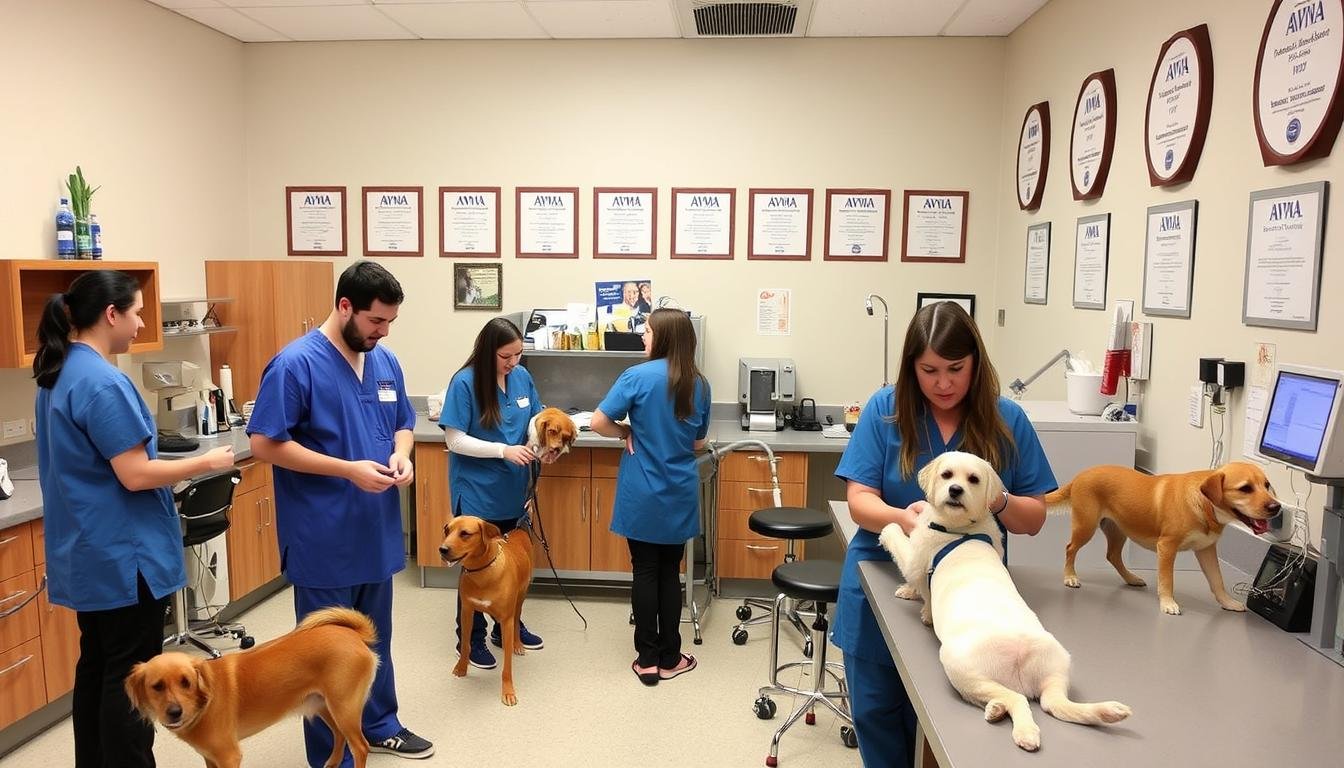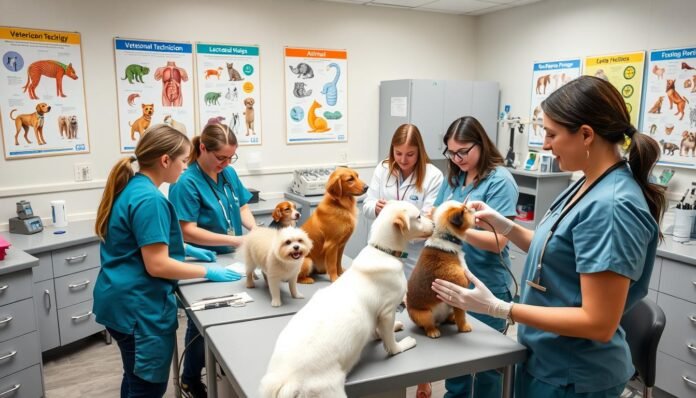Vet techs help care for animals. They work with vets to keep pets healthy. “How many years of School to be a Vet Tech.”
This guide shows how to become a vet tech. We’ll look at schooling and job options.
An inspiring veterinary technician classroom scene features students engaged in hands-on animal care training with various pets, colourful educational posters on the walls about animal anatomy and health, a teacher demonstrating proper techniques, surrounded by medical equipment and tools, and a bright and welcoming atmosphere.
Vet techs do many important jobs. They give medicines and run tests for sick animals.
They also help vets during exams and surgeries. Vet techs make sure animals get good care.
Understanding the Role of a Vet Tech
Vet techs are key players in animal healthcare. They assist vets and care for animal patients.
Vet techs often talk to pet owners first. They connect vets with clients.
Vet techs make sure animals are healthy. They check vital signs and give medicine.
They also take blood samples and set up IV lines. Vet techs clean and prepare medical tools.
Vet techs need good people skills. They teach pet owners about proper care.
They support clients during treatment. Vet techs offer kind help and advice.
Vet assistants do basic animal care tasks. They feed, groom, and clean up after animals.
Vet techs do more advanced medical work. They give higher-level support to vets.
Veterinary Technician Education Pathways
Want to be a vet tech? You have choices for your education. Most people pick associate or bachelor’s degree programs in vet tech.
These programs teach you how to care for animals. They give you hands-on practice, too. You’ll learn what you need to do well in this job.
Associate degree programs take about 2 years. You’ll study animal bodies and how to help in surgery. These programs get you ready for your first vet tech job.
Bachelor’s degree programs last about 4 years. They teach more advanced topics. You’ll learn about animal medicines and lab work. This degree can help you get better jobs.
Both types of programs meet high standards. They make sure you learn everything you need. Think about which one fits you best.
Duration of Vet Tech Programs
Vet tech programs can take different amounts of time. Traditional programs last about two years and lead to an associate’s degree.
These programs cover animal anatomy, nursing, and lab procedures. Accelerated programs offer a faster option for aspiring vet techs.
Accelerated programs can be finished in 12-18 months. They provide the same essential coursework in a more intensive format.
Program duration can vary depending on whether students are enrolled full-time or part-time. Part-time students may take longer to complete their education.
This option helps those with work, family, or other commitments. The time it takes to become a vet tech will depend on your situation.
Accreditation and Its Importance
AVMA-accredited schools offer top-notch veterinary education. These programs ensure students meet rigorous industry standards and receive high-quality training.
The AVMA accreditation process thoroughly evaluates program quality. It checks curriculum, faculty, facilities, and overall educational standards.
Graduates from AVMA-accredited programs have a competitive edge in the job market. Employers recognize the quality and dedication required to complete these programs.
AVMA-accredited school graduates can take the Veterinary Technician National Examination (VTNE), which is crucial for obtaining professional certification.
A modern veterinary technician classroom with students engaged in hands-on learning featuring various animals, veterinary equipment, and AVMA accreditation certificates displayed on the walls. The atmosphere is bright and inviting, showcasing a blend of technology and compassion in animal care.
Accreditation status is vital for aspiring veterinary technicians. Choosing AVMA-accredited schools ensures a top-quality education and future success.
Licensing and Certification Requirements
Becoming a licensed vet tech is vital for this rewarding career. The National Veterinary Technician Examination (NVTE) is the main credential needed.
This exam tests knowledge in various areas of veterinary medicine. It covers animal anatomy, physiology, pharmacology, and emergency care.
Vet techs must also meet state-specific licensure requirements. These often include finishing an accredited program and passing a background check.
Keeping vet tech certification current is crucial. Most states require license renewal every one to two years.
Renewal may involve completing continuing education hours. This ensures vet techs stay updated on new developments.
Certification shows commitment to the profession and animal care, and it’s a key part of successful vet tech careers.

Specializations in Veterinary Technology
Vet techs can explore various specializations in animal care. These roles offer job satisfaction and career growth opportunities.
Emergency care is a popular field for vet techs. They learn to handle life-threatening situations quickly and effectively.
Anesthesia is another area of expertise. Vet techs learn to administer and monitor anaesthesia during surgeries.
Dental technology is a growing niche for vet techs. They gain skills in dental care, x-rays, and minor procedures.
Some vet techs focus on exotic pets or wildlife care, while others work with large animals like horses and livestock.
Advanced training is needed for these specialities. Vet techs can earn certifications to enhance their skills.
Specialized education can lead to better job prospects. It also helps vet techs provide exceptional care to animals.
Continuing Education for Vet Techs
Vet techs must stay updated with the latest advancements in veterinary medicine. Ongoing education is key to enhancing skills and improving patient care.
Vet techs can earn credits through workshops, conferences, and online courses. These programs cover new treatments, technologies, and important soft skills.
Continuing education shows a vet tech’s dedication to their job. It leads to better patient outcomes and higher client satisfaction.
By constantly learning, vet techs boost their careers. They also help advance the entire veterinary industry.
Job Outlook and Salary Expectations
Pet care jobs are growing fast. Vet tech jobs will increase 15% from 2019 to 2029.
Vet tech pay varies by location and experience. The median yearly salary is $35,320.
Top earners make over $50,000 per year. Speciality hospitals and research jobs pay more.
Vet techs can grow in their careers. They can work in emergency care or labs.
More training can lead to leadership roles. This field offers many chances to advance.
Vet tech jobs have a bright future. It’s a great choice for animal lovers.
Conclusion: Is It Worth the Investment?
Becoming a vet tech is rewarding but requires time and money. The job outlook is good, with 15% growth expected by 2031.
A two-year vet tech degree costs between $10,000 and $30,000. But the vet tech career satisfaction often makes up for the cost.
Vet techs work long hours and physically demanding work. They also experience the sadness of seeing sick animals.
Yet, for those who love animals, the future of animal healthcare looks bright. Working with vets to help animals can be very fulfilling.
FAQ
How many years of schooling are required to become a veterinary technician?
Most vet tech programs take 2-3 years to finish. They lead to an associate’s degree or certificate.
Some schools offer 4-year bachelor’s degrees in vet tech, too.
What are the typical duties and responsibilities of a veterinary technician?
Vet techs help vets with many tasks, including patient care, lab work, X-rays, and medication administration.
They play a key role in animal hospitals and clinics.
What are the different educational pathways to becoming a veterinary technician?
You can get an associate’s or bachelor’s degree in vet tech. These programs are at community colleges, tech schools, or universities.
How long do vet tech programs typically take to complete?
Associate’s degrees take about 2 years. Bachelor’s degrees take about 4 years.
Some schools offer faster or part-time options, too.
Why is accreditation important for vet tech programs?
AVMA accreditation ensures top-notch education standards. It prepares students for the NVTE and state license rules.
What are the licensing and certification requirements for veterinary technicians?
Vet techs must pass the NVTE and get a state license. Rules vary by state, so check your area.
What are some of the specialization options for veterinary technicians?
Vet techs can train in emergency care, anaesthesia, or dental tech. Specializing can lead to better jobs and pay.
How important is continuing education for veterinary technicians?
Ongoing learning is key for vet techs. It helps them stay current with advances in new vet medicine.
They can learn through workshops, conferences, and online courses.
What is the job outlook and salary range for veterinary technicians?
The job outlook is good, with 15% growth by 2030. Pay ranges from $30,000 to $50,000 per year.
Salary depends on location, experience, and specialization.
You may also read: How to Become a Vet Tech: Career Path Guide
